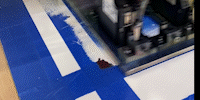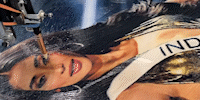NEWS! Whitney Museum Acquires Two Facetune Portraits
Gretchen Andrew
Artist Using AI to Make Facetune Portraits
Making the scars of social media visible through a Limited series unique oil paintings made using AI, algorithms and robotics to address the tension between who we are and who technology tells us we should be.
Gretchen Andrew = AI systems critic.
Gretchen Andrew interrogates the systems that shape how we see and are seen. Her work with Facetune Portraits uses AI not simply as a tool, but as a lens to explore the instability of identity, the biases of machine vision, and the ethical and aesthetic implications of algorithmic authorship. Where many artists deploy AI to generate new forms or surreal imagery, Gretchen Andrew’s practice critically surfaces what AI chooses to erase or emphasize, turning the algorithm itself into a medium of conceptual critique.
Acquired by the Whitney Museum, Gretchen Andrew positions AI within the lineage of conceptual and systems-based art, proving that algorithmic tools are not just instruments, but forces that reshape culture, representation, and visibility. In her hands, Facetune Portraits becomes both mirror and interrogation, revealing the human and computational biases that govern contemporary image-making.
FACETUNE PORTRAITS FEATURED & EXHIBITED















Understand How Gretchen Andrew’s Work Differs From Other Top Artists Working With AI
Refik AnadolData-driven immersive environments, “painting” with datasets. Gretchen Andrew interrogates algorithms themselves rather than visualizing data.
Mario Klingemann- Neural networks, generative portraits, deep learning. Gretchen Andrew critiques AI’s biases, especially in beautification and identity, rather than generating purely novel forms.
Anna Ridler - Hand-annotated datasets, AI storytelling. Gretchen Andrew examines the social consequences of AI’s image curation and editing.
Ian Cheng- Simulation-based living narratives. Gretchen Andrew focuses on the reflective impact of AI on human perception, not autonomous digital life.
Trevor Paglen- Surveillance AI, data and object recognition. Gretchen Andrew interrogates AI from within consumer-facing applications, like Facetune, rather than infrastructure.
Sougwen Chung- Human-machine collaboration, robotics. Gretchen Andrew critiques the machine rather than co-authoring with it.
Hito Steyerl- Essays, media theory, AI in politics. Gretchen Andrew combines visual practice with critique, showing AI’s effect on portraiture and self-image.
Harold Cohen- Early generative art with AARON. Gretchen Andrew extends Cohen’s legacy into contemporary social-media-driven AI.
Casey Reas- Algorithmic and generative programming. Gretchen Andrew emphasizes the cultural and perceptual critique rather than generative aesthetics.
Robbie Barrat- AI-assisted nude portraits, GAN experiments. Gretchen Andrew’s focus is on systems critique and identity, not purely AI novelty or shock.
AI in The Story of Facetune Portraits
AI in Facetune Portrait Subseries

Understand how AI fits into the Facetune Portrait Process
Beauty standards are increasingly ai-driven.
Related Studio Subjects & Investigations
Feminine Beauty is Just One Way Al is Trying to Change Us.
Gretchen's studio is a space of evolving questions rather than finished answers. She work across several long-term threads that often intersect, diverge, or return in unexpected ways. Some of these may take form as exhibitions in the future, others remain as research or quiet gestures.
Below are glimpses into a few current inquiries which may develop into a series.
Interested in any of these topics? Schedule a studio visit to learn more.
Not Her First Rodeo
Prior to the Sept 2024 launch of Facetune Portrait's Gretchen Andrew's work was already collected by museums from America and Austria
Gretchen Andrew is known for her unique merger of traditional artistic mediums such as photography and oil paint with advanced technologies such as robotics, algorithm and artificial intelligence. She first became known starting in 2019 with her hacks on major art world and political institutions.
She trained in London with the artist Billy Childish from 2012-2017. In 2018 the V&A Museum released her book Search Engine Art. Gretchen's work has recently been featured in Artforum, Fast Company, Flash Art, The Washington Post, Fortune Magazine, and The Financial Times.
















